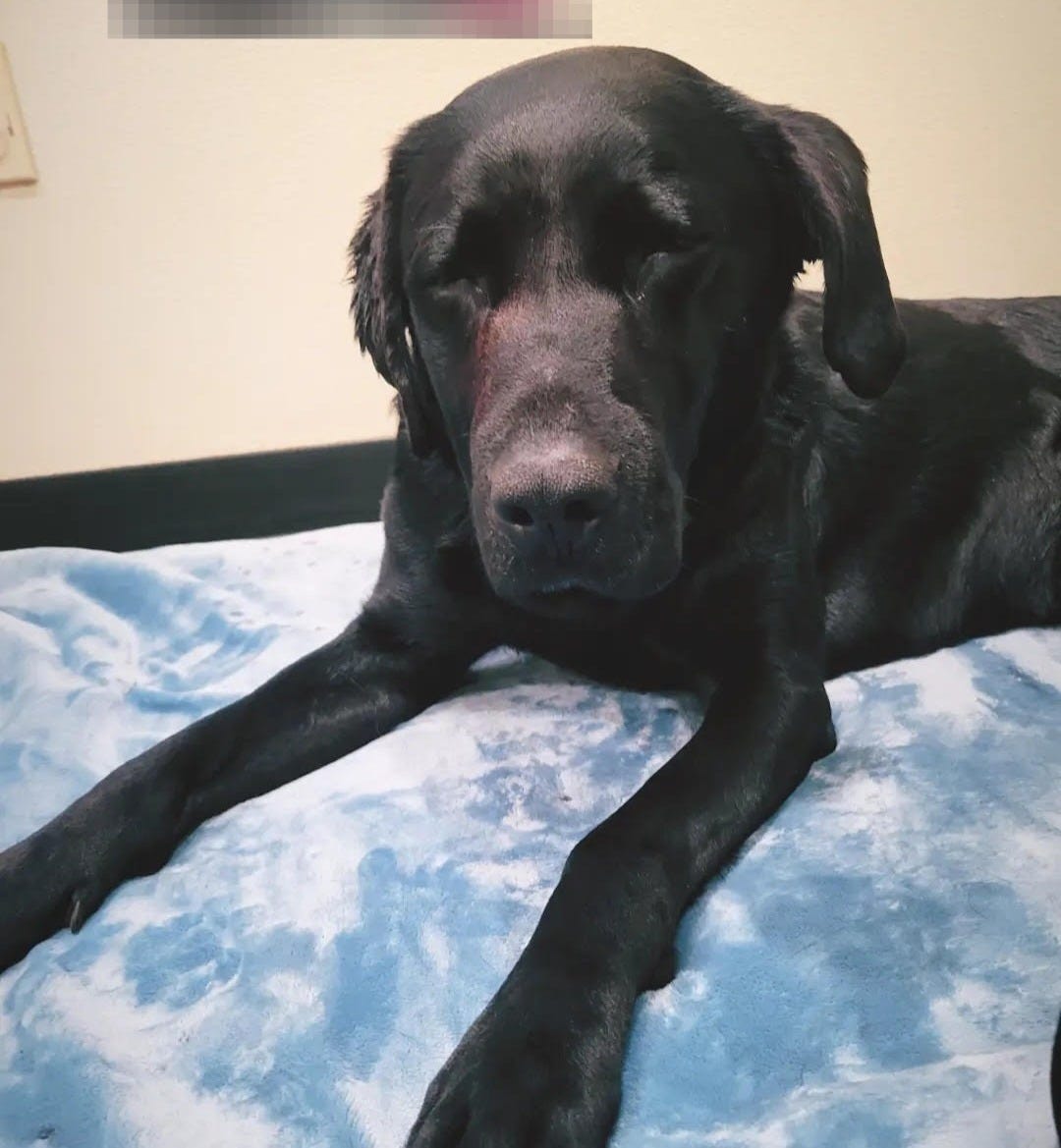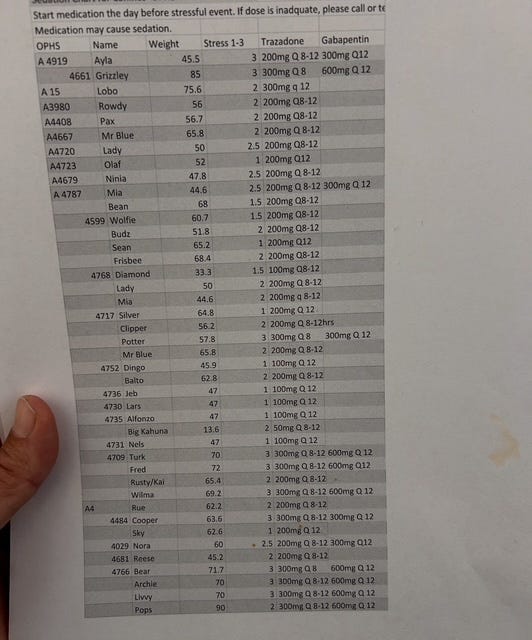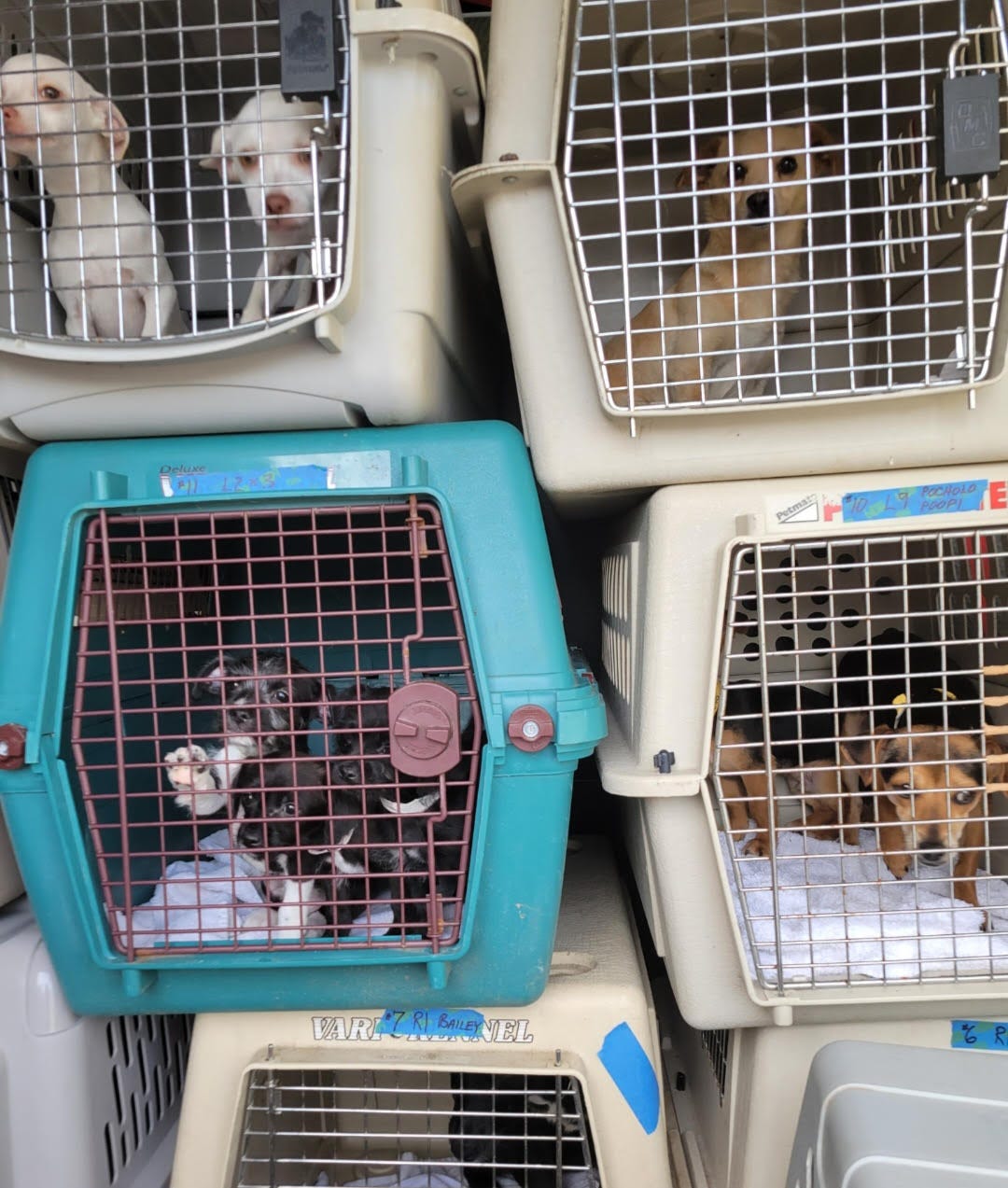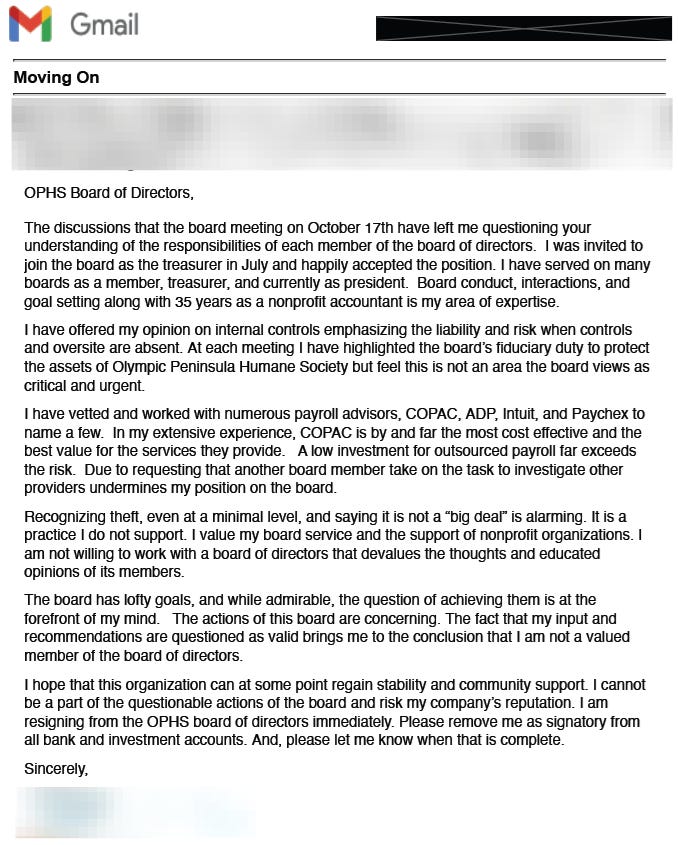Readers may find the images and videos in this article disturbing.
The Olympic Peninsula Humane Society (OPHS) is facing serious allegations from former employees, volunteers, and a board member who describe a toxic work environment, mismanagement, and a disturbing lack of transparency. Testimonies from ex-staff members and a recent resignation letter from the former treasurer paint a picture of an organization plagued by worker exploitation, safety concerns, and questionable financial practices.
Multiple former employees and volunteers have contacted CC Watchdog to report instances of extreme neglect that directly led to the deaths of numerous dogs. They say that the county, which had contracted with OPHS, was made aware of these conditions but failed to intervene.
Puppies were left unsupervised in an office and died after consuming staples.
Puppies were inadequately fed by untrained staff, leading to choking deaths. Those that survived developed severe resource-guarding behaviors due to prolonged food scarcity, a problem that was easily resolved with proper feeding.
Puppies were bathed in the same bathtub as Parvo-positive dogs, leading to their deaths from infection.

Overcrowding exacerbated these issues. One former OPHS volunteer shared, “They took so many dogs from out of state just to get more money. The Bark House was full, so they filled outbuildings with crates. It was one in the afternoon when I filmed this video, and the dogs hadn’t been walked since the previous day. After walking all of them, it took a lot more time to clean the cages than if they had been walked in the morning.”
Dog fights occurred frequently because inexperienced staff were handling aggressive animals. One particularly disturbing incident involved a faulty harness and a manager who hired an uncertified trainer from Craigslist, leading to a violent confrontation between two dogs. Employees left traumatized, covered in blood, with no support or training from management on how to prevent such incidents in the future.

Lack of medical oversight and misuse of controlled substances
Another major concern was the unauthorized handling of controlled substances by employees with no veterinary background—an illegal practice. Staff were expected to administer prescription medications without veterinary supervision, leading to dangerous consequences. Anti-anxiety medications like Trazodone and Gabapentin were readily accessible and frequently stolen.
Inadequate documentation resulted in inconsistent dosing, worsening animals’ conditions. Dogs on daily anxiety medication were often adopted out without disclosure, forcing them to stop cold turkey rather than being properly weaned off, as veterinarians recommend.

Toxic workplace culture and worker exploitation
A former employee, whom we will refer to as "Jodi," recounts her harrowing experience at OPHS, describing a culture where hardworking employees were overburdened and underpaid, all under the guise of "doing it for the animals." Employees were expected to work long hours with minimal support, leading to physical exhaustion and burnout. Those who spoke up were met with verbal abuse and intimidation from management.
Additionally, Jodi and other female employees reported experiencing sexual harassment from a former manager. Despite assurances from Executive Director Luanne Hinkle that reporting misconduct would be met with protection, Jodi was ostracized and harassed by coworkers after her complaint led to the manager’s termination.
Financial mismanagement and lack of transparency
Beyond the troubling working conditions, OPHS has been accused of financial mismanagement and secrecy. The organization’s former treasurer resigned in October 2024, citing deep concerns over the board’s lack of oversight. In a resignation letter, the Treasurer wrote:
"Recognizing theft, even at a minimal level, and saying it is not a ‘big deal’ is alarming. It is a practice I do not support. I am not willing to work with a board of directors that devalues the thoughts and educated opinions of its members."
The letter further criticized the board for ignoring fiduciary responsibilities and failing to implement necessary financial controls. The treasurer’s departure raises significant questions about how OPHS is managing donor funds and whether ethical lapses are occurring behind closed doors.
Executive Director declines to answer questions in writing
According to Jodi, low wages and inadequate benefits attracted employees struggling with addiction. These individuals were often permitted to live in their cars on the property. Although narcotics for animals were stored in a secure cabinet, Jodi described a lack of security:
“90% of the time, the key was hanging out of the lock,” she said. “If a drug was being used that day, it was simply left in the kitchen drawer next to the spoons. Many employees struggled to perform their duties because they were drunk, high, or out getting high.”
Attempts to report drug use or unsafe conditions were met with verbal abuse and retaliation from management.
CC Watchdog submitted a list of questions to OPHS interim Executive Director Paul Stehr-Green, seeking clarification on staffing costs, facility conditions, and potential suppression of workers’ compensation claims. Stehr-Green declined to respond in writing, insisting on a phone call, which scheduling conflicts prevented.
Some of the most pressing unanswered questions include:
Why did OPHS maintain a staff of nine employees to care for just 20-40 cats during its 6-month closure?
Were dangerous dogs improperly removed from the facility and reintroduced into the community?
What protocols exist to prevent narcotics from being abused or stolen by employees?
Why did OPHS import dogs from outside Clallam County?

The toll on employees and animals
For Jodi, the trauma of working at OPHS continues to affect her. She described experiencing panic attacks and severe anxiety when approaching the facility, symptoms she attributes to the hostile work environment and lack of support. Many of her former colleagues faced similar mental health struggles due to the overwhelming demands and toxic workplace culture.
Meanwhile, the animals—many of whom have already faced neglect or abuse prior to arriving at OPHS—may be suffering from further neglect due to chronic understaffing, inadequate training, and inconsistent medical care. Former employees and volunteers want the community to understand that supporting OPHS equates to supporting the neglect of animals and the mistreatment of workers.
“This is not a way for a puppy to be,” explained one former OPHS employee who submitted a video of a black puppy shaking and surrounded by excrement. “Alone, during the most essential socialization age. He was always alone and scared.”
Community accountability
There is speculation that OPHS will once again approach Clallam County to regain the $125,000 contract for caring for the county’s stray, unwanted, and dangerous dogs. Addressing the challenges faced by the organization, Commissioner Mark Ozias defended OPHS, stating that it remains an important component of the animal solutions team.
Former volunteers and workers say OPHS would like the public to believe that the organization has undergone an overhaul, but in reality, many board members, including the president, were active in the organization when it was at its worst. They did nothing to rectify the extreme neglect at the Bark House.
Past kennel techs who ignored isolation protocols, leading to deadly outbreaks, have been rehired. The vet services manager who oversaw the worst conditions remains in place. Multiple current staff members previously fostered dogs that died under their care.
Not enough has changed.
If OPHS is to regain the trust of its staff, volunteers, and donors, major reforms are necessary. The question remains—will the organization take meaningful steps to address these concerns, or will secrecy and mismanagement continue to define its operations?
Last week, subscribers were asked if they supported keeping the 4th of July fireworks display in Sequim. Of 299 votes:
76% said, “Yes, they’re important.”
19% said, “No, cancel or replace with drones.”
5% needed more information.





Caring for stray, abandoned, and/or surrendered animals, at any scale, is not a simple task. I feel badly for the dogs.
All indicators seem to suggest that WAG has their act together, but I don't know that they deal with such a volume of pups.
Thanks for your tenacious reporting, Jeff, and to the courageous whistleblower(s).
Thanks for this report. We have been constantly asked by OPHS to donate, we used to but then things started to get unexplainable so we imformed OPHS that we have withdrawn our support until they can demonstrate good management and care. This report reinforces our decision to not fund them.